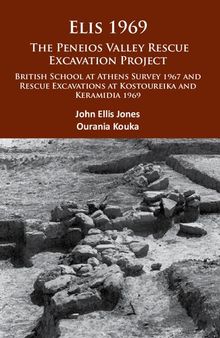 جزییات کتاب
جزییات کتاب
In the 1960s a great new barrier dam was built across the Peneios Valley in Elis in the N.W. Peloponnese to create an artificial lake for irrigation purposes. In 1967 the Greek Archaeological Service organised a preliminary survey of the areas to be affected and also asked all the Foreign Archaeological Schools to assist and allocated specific sections to each. The British School at Athens sent a small team in late 1967 to survey part of the south-west fringes of the area to be flooded; this team identified many sites and opened test-trenches at six of them. In 1969 further work was undertaken in that area for the British School: a small team from Birmingham University and from Bangor undertook excavations at two of the identified sites, ‘Kostoureika’ and ‘Keramidia’. This account describes the results in detail. ‘Kostoureika’, identified as a likely Hellenistic ‘villa’ proved structurally disappointing (the 1967 test-trench had located the only surviving wall), but revealed a deposit of Early Helladic pottery, which supplements very usefully evidence for early occupation in the north-west Peloponnese. ‘Keramidia’ proved to be a site occupied, at least at times, from the Hellenistic to the late Roman imperial period.Table of ContentsIntroductionBritish School at Athens Survey, 1967British School at Athens Excavations, 1969KostoureikaKeramidiaCatalogues of FindsCatalogue I: Kostoureika Early Helladic (KTR EH)Catalogue II: Kostoureika Hellenistic (KTR H)Catalogue III: Kostoureika III and IVCatalogue IV: KeramidiaCatalogue V: 'Keramidia Hill' (KER.HILL / KH)



 دانلود کتاب
دانلود کتاب

 جزییات کتاب
جزییات کتاب





 این کتاب رو مطالعه کردید؟ نظر شما چیست؟
این کتاب رو مطالعه کردید؟ نظر شما چیست؟
